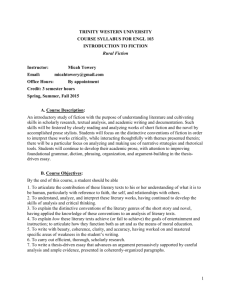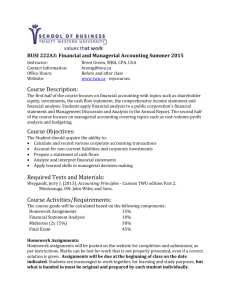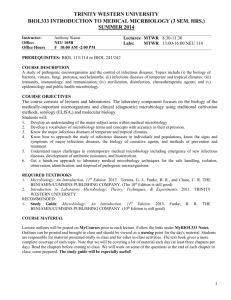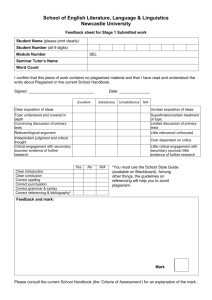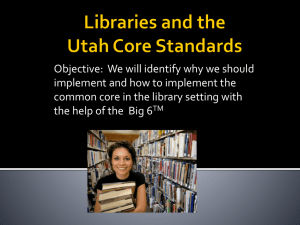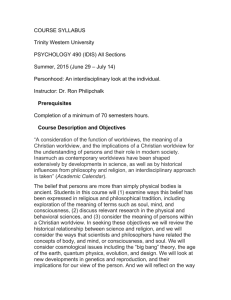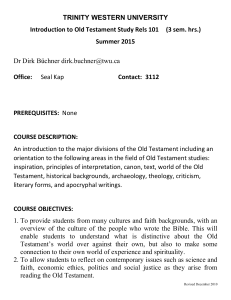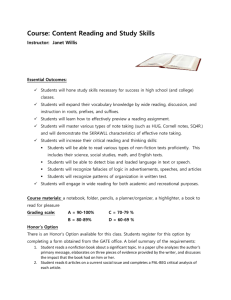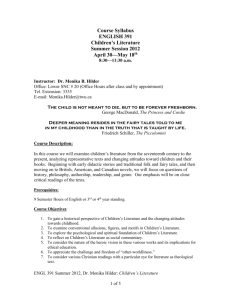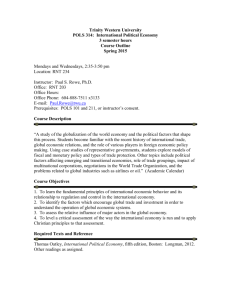SU2015 Syllabus - Trinity Western University
advertisement
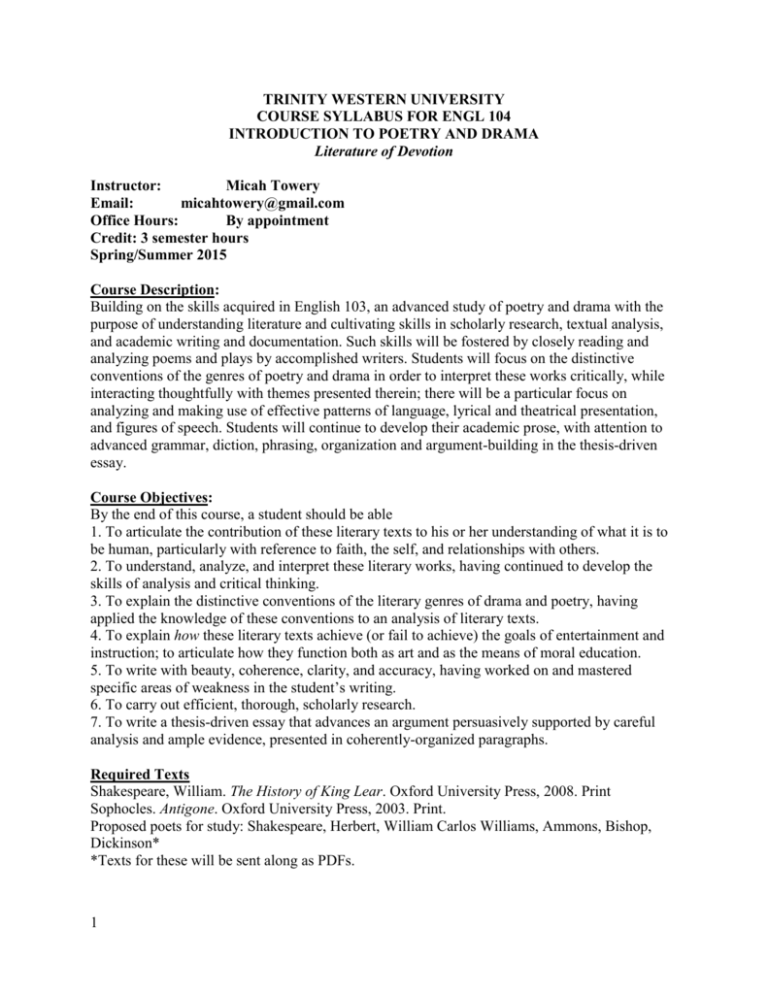
TRINITY WESTERN UNIVERSITY COURSE SYLLABUS FOR ENGL 104 INTRODUCTION TO POETRY AND DRAMA Literature of Devotion Instructor: Micah Towery Email: micahtowery@gmail.com Office Hours: By appointment Credit: 3 semester hours Spring/Summer 2015 Course Description: Building on the skills acquired in English 103, an advanced study of poetry and drama with the purpose of understanding literature and cultivating skills in scholarly research, textual analysis, and academic writing and documentation. Such skills will be fostered by closely reading and analyzing poems and plays by accomplished writers. Students will focus on the distinctive conventions of the genres of poetry and drama in order to interpret these works critically, while interacting thoughtfully with themes presented therein; there will be a particular focus on analyzing and making use of effective patterns of language, lyrical and theatrical presentation, and figures of speech. Students will continue to develop their academic prose, with attention to advanced grammar, diction, phrasing, organization and argument-building in the thesis-driven essay. Course Objectives: By the end of this course, a student should be able 1. To articulate the contribution of these literary texts to his or her understanding of what it is to be human, particularly with reference to faith, the self, and relationships with others. 2. To understand, analyze, and interpret these literary works, having continued to develop the skills of analysis and critical thinking. 3. To explain the distinctive conventions of the literary genres of drama and poetry, having applied the knowledge of these conventions to an analysis of literary texts. 4. To explain how these literary texts achieve (or fail to achieve) the goals of entertainment and instruction; to articulate how they function both as art and as the means of moral education. 5. To write with beauty, coherence, clarity, and accuracy, having worked on and mastered specific areas of weakness in the student’s writing. 6. To carry out efficient, thorough, scholarly research. 7. To write a thesis-driven essay that advances an argument persuasively supported by careful analysis and ample evidence, presented in coherently-organized paragraphs. Required Texts Shakespeare, William. The History of King Lear. Oxford University Press, 2008. Print Sophocles. Antigone. Oxford University Press, 2003. Print. Proposed poets for study: Shakespeare, Herbert, William Carlos Williams, Ammons, Bishop, Dickinson* *Texts for these will be sent along as PDFs. 1 Course Procedures and Guidelines: 1. As Christian scholars pursuing higher education, academic integrity is a core value of the entire TWU community. Students are invited into this scholarly culture and required to abide by the principles of sound academic scholarship at TWU. This includes, but is not limited to, avoiding all forms of plagiarism and cheating in scholarly work. TWU has a strict policy on plagiarism (see Academic Calendar 2000-10, pp. 39-40). Learning what constitutes plagiarism and avoiding it is the student's responsibility. An excellent resource describing plagiarism and how to avoid it has been prepared by TWU Librarian William Badke and is freely available for download (PPT file) or used as flash (self running) tutorials of varying lengths from: http://www.acts.twu.ca/lbr/plagiarism.ppt http://www.acts.twu.ca/lbr/Plagiarism.swf (14 minute flash tutorial) http://www.acts.twu.ca/lbr/Plagiarism_Short.swf (8 minute flash tutorial) 2. Academic dishonesty can include (but is not limited to) presenting someone else’s ideas or words as your own, quoting another source without providing a proper citation, failing to place quotation marks around quoted material, allowing another student to copy your work, submitting a paper you have written for one course to another course without first obtaining permission from both instructors, purchasing or downloading an essay on the internet, or having another person write an essay for you. The Little, Brown Handbook offers helpful advice on what plagiarism is and how to avoid it. We will also discuss the proper citation of sources in class, but it is your responsibility to maintain your academic integrity. Students are reminded that essays written for this course may be subject to scanning by a plagiary detection service employed by the university. Plagiarized papers will result in a minimum of a failing grade (zero) on the assignment; serious cases of plagiarism may result in failure in the course and expulsion from the university. 3. In the event of deteriorating weather conditions or other emergency situations, every effort will be made to communicate information regarding the cancellation of classes to the following radio stations CKNW (980 AM), CKWX (1130 AM), STAR FM (107.1 FM), PRAISE (106.5 FM) and KARI (550 AM). As well, an announcement will be placed on the University’s campus closure notification message box (604.513.2147) and on the front page of the University’s website (http://www.twu.ca – also see http://www.twu.ca/conditions for more details). An initial announcement regarding the status of the campus and cancellation of classes is made at 6:00 AM and covers all classes beginning before 1:00PM. A second announcement is made at 11:00AM that covers all classes which begin between 1:00PM and 5:00PM. A third announcement is made at 3:00PM and covers those classes which begin after 5:00PM. 4. With the exception of directed studies, assignments are due at the beginning of class on the dates stipulated below. Late assignments will be subject to penalties of 3% per day. No electronic submissions of papers will be accepted without a hard copy of that paper also personally handed to the instructor soon after. Papers handed in to the English department will no longer be accepted. No late papers will be accepted after the last day of our class. 5. If a student is having trouble (for whatever reason) completing any of the assignments for the course, please notify the instructor before the assignment’s due date in order that the late 2 assignment penalty may be negotiated. 6. Consistent and punctual attendance is expected. Absences should be avoided and explained by a note to the instructor or a medical certificate, especially in the event of group presentations, tests, in-class essays, and final examinations. Regular class attendance and oral contributions to class discussions are components for the grade assigned to class participation. 7. Students are responsible for reading the assigned sections of texts before the class dates indicated below. Assignments: Due dates are TBD. Upon receiving the syllabus, the student will email the professor with suggested due dates. Once the dates are approved, the student must ask for extensions if necessary. Late assignments will be penalized 3% per day. Four Independent Reading Logs – 10% each The student will research some literary aspect of one of the assigned readings of the student’s choice (e.g., one of the poems or plays, or some overarching aspect from several poems by one author). The student should focus on different readings/authors for different logs. The student will summarize the opinions of 2-3 scholars on this aspect (300-500 words) and then write a 300 word reflection on how the findings impact interpretation of the work. This should include a Works Cited page and be in MLA format. Short Analysis (750 words) – 10% The student will do an interpretive reading on one of the assigned literary works--again, of the student’s choice. It is not recommended that the student use any outside sources for this work. MLA format. Long Analysis (1500 words) – 20% The student will do an interpretive reading on one of the assigned literary works of the student’s choosing. The student must incorporate the scholarly opinions of 2-4 scholars. MLA format. Take Home Final Exam – 30% 3
